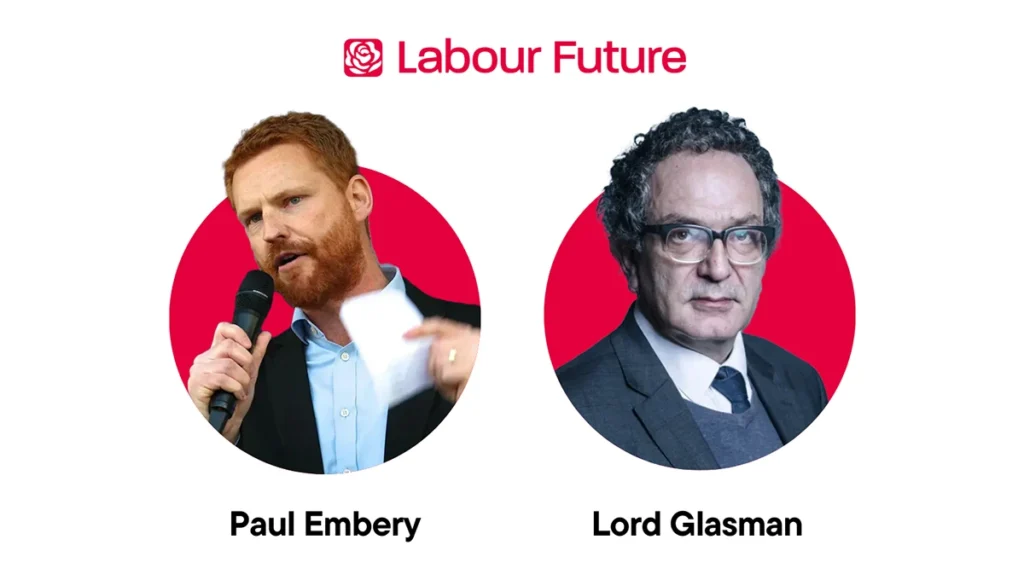Last week at Labour Conference we were pleased to host our first fringe event in many years.
We hosted an “in conversation event” with Paul Embery and Lord Maurice Glasman. Embery is a British political commentator, author, trade union activist, and former firefighter. Lord Glasman is Labour life peer and founder of Blue Labour. This provided a compelling and in-depth discussion on the future of the Labour Party and what we need to do collectively as a movement to beat the populists of Reform.
As one would expect with Paul and Maurice, a frank dialogue and honest appraisal of the issues facing the party was at the forefront of their exchange.
State of play
The Labour Party was elected in 2024 on a mandate for change. After 14 years of Tory rule and mismanagement Keir Starmer led the party to power to a landslide majority. But one year on the government is flailing in the polls with Reform forecast to have a majority or at least by the largest party after any election.
Of course, opinion polls are a snapshot of a moment in time, and they can change. A lot of polling research shows that while at present the Labour and the Prime Minister are extremely unpopular, the public are still prepared to give the government a chance to turn things around. The big question is how that should be done.
Need for delivery on industrial strategy
In the new global era of uncertainty that we now live in, the British people want to feel that their country is strong and secure and in policy terms this translates in many ways.
Both Paul and Maurice discussed the need for there to be a comprehensive industrial strategy that incentivises investment into areas of high productivity such as plant, machinery, automation and energy.
These areas of the economy provide high skilled employment with high wages and help build a resilient economy. The government has stepped in to support areas of the economy, such as steel, and has demonstrated its capacity to create conditions where high skilled work, such as shipbuilding, can successfully be done in Britain.
We now need to ensure that the UK industrial strategy is streamlined to give focus to this kind of investment to drive growth which is the overarching mission of the government. The government was right to afford apprenticeships the same weight as university placements, and it is vital that skills are given the respect they deserve because their value to the economy is great. If we are to build a resilient economy and increase our industrial output that skills base will be essential.
Give working people back agency
Both Paul and Maurice are long term analysts of the Labour Party’s relationship with working class communities. An interesting proposition was put from the audience concerning the very essence and feel of Labour. Describing the demographic and social changes of the party, an audience member noted, how Labour’s emerging policy does not align.
They posited:
- Fifty years ago most of the Labour MPs were former miners, shop stewards and now most of them are former researchers, academies or third sector workers.
- Thirty years ago, Labour conference platforms were full of politicians smoking their pipes and now Labour is pushing through with banning tobacco and vapes.
- Labour politicians of yesteryear were famous for their consumption of alcohol; John Prescott famously drank a pint in less than ten seconds and now the government’s alcohol strategy aims to massively reduce consumption.
Maurice believes that is an element of the party that does hold the working class in contempt. But these people are the very people who are moving over to Reform in their droves.
Nigel Farage is famous for his pint and a cigarette and while that image is crafted it also subtly and subconsciously indicates to those traditional labour voters that Reform is where their home ought to be and not with Labour. Now, how Labour overcomes that image problem is yet to be seen. While it is something that is difficult to measure and quantify, cultural and even leisure association is important.
During the discussion a theme continuously emerged. In modern Britain, voters lack a total sense of agency over their own lives and decisions. This can be from deciding whether they want to smoke or vape, or whether they are waiting for a council house, or seeing their borders uncontrolled.
Stop quangos controlling decision making
The Labour government deserves credit for its ambition to reform local government — streamlining councils, improving accountability, and giving communities more control over their lives. However, a deeper issue remains: the excessive outsourcing of power to unelected bodies.
For too long, vital decisions have been delegated to quangos and regulatory institutions that operate at arm’s length from democratic accountability. These bodies often make decisions that elected ministers would never take — yet ministers are left to answer for them. This dynamic weakens trust in government and undermines the sense that people can influence the policies that shape their lives.
A striking example came a few years ago when Homes England criticised local councils for failing to meet housing targets, even as Natural England blocked new developments under nutrient neutrality rules. The result was a stalemate: nearly 100 local authorities were prevented from building the homes their residents desperately needed. It took years to resolve, with growth and opportunity lost in the meantime.
This illustrates a wider truth — when no one is truly in charge, progress stalls. If Labour is to deliver growth and restore faith in politics, it must bring decision making back under democratic control, ensuring that those elected to govern can actually do so.
Our insight for the future
If Labour is to win again it needs to take back control and use the full power of the British state to deliver on its manifesto commitments. It needs to implement economic policies that drive industrial growth to build a resilient economy and keep our country secure. It needs to have agency and give people agency. It must control our borders, and the boats must be stopped. It should let people live their own lives. If we do these things, Reform will have nothing, and Labour will win again.




